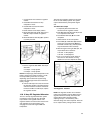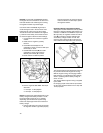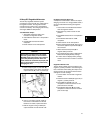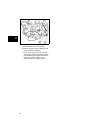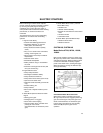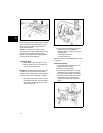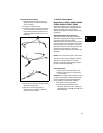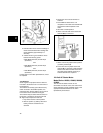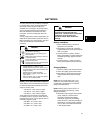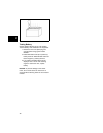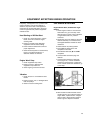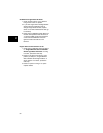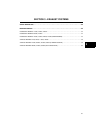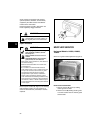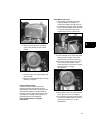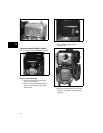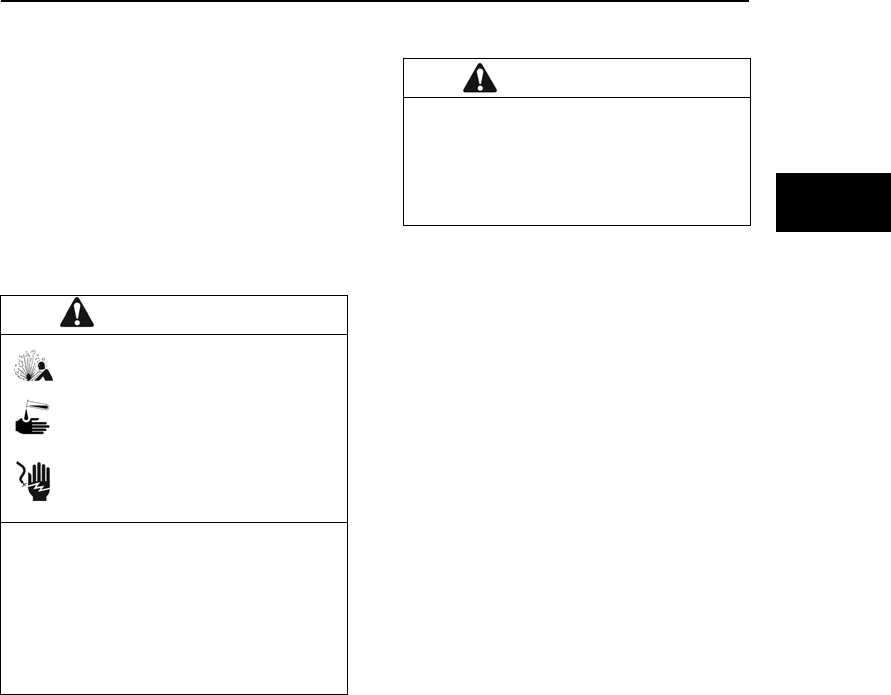
47
2
2
BATTERIES
A 12 Volt, lead acid, wet cell battery is required
to operate starter motors on Briggs & Stratton
OHV single cylinder engines. This type is
available as a wet charge or dry charge battery.
The wet charged maintenance-free battery is
filled with electrolyte and sealed at the time
production. The level of electrolyte cannot be
checked.
The dry charge battery requires electrolyte to be
added at the time the battery is placed in service.
Before activating a dry charge battery, read and
follow the manufacturer’s recommended
procedure.
Battery and Cable Recommendations
These battery size recommendations are based
on minimum temperature expected and correct
weight of oil being used.
• 30 Amp. Hr. +20ºF (-6ºC) or higher
• 40 Amp. Hr. -5ºF (-20ºC) or higher
• 50 Amp. Hr. -15ºF (-26ºC) or higher
These cable sizes are based on total distance
from battery positive (+) post to starter switch or
solenoid and to starter, plus the ground return to
the battery negative (-) post.
• #6 AWG - 4 ft. (1.2m) or less
• #5 AWG - 5 ft. (1.5m) or less
• #4 AWG - 6 ft. (1.8m) or less
Battery Installation
1. Before installing battery, connect all
equipment to be operated.
2. Place battery in holder with a flat base.
Tighten holder down evenly until snug. DO
NOT over tighten.
3. Connect positive (+) cable to positive
battery post FIRST, to prevent sparks from
accidental grounding. Tighten connector
securely.
4. Connect negative (-) cable to negative
battery post. Tighten connector securely.
Charging Battery
1. Clean the battery of all dirt and corrosion.
2. Clean, then lightly grease the terminals.
3. Bring battery to full charge using a taper
charge (automatically reduces charge
rate).
NOTE: Do not exceed charge rate of 1/10
ampere for every ampere of battery rating.
Consult battery manufacturer for maximum
charge recommendations.
NOTE: If battery gets hot to the touch or is
spitting acid (gassing) excessively, unplug
charger periodically.
4. With battery fully charged, check specific
gravity readings of each cell with a
temperature-compensated Battery
Hydrometer (Figure 40). All readings
should be above 1.250 (compensating for
temperature). If specific gravity readings
vary by .050 or if all cells read less than
1.225, replace battery.
WARNING
Storage batteries give off explosive hydro-
gen gas during recharging.
Slightest spark will ignite hydrogen and
cause explosion.
Battery electrolyte fluid contains acid and
is extremely caustic.
Contact with battery contents will cause
severe chemical burns.
A battery presents a risk of electrical shock
and high short circuit current.
• DO NOT dispose of a battery in a fire.
• DO NOT allow any open flame, spark, heat, or
lit cigarette during and for several minutes after
charging a battery.
• DO NOT open or mutilate the battery.
• Wear protective goggles, rubber apron, and
rubber gloves.
• Remove watches, rings, or other metal objects.
• Use tools with insulated handles.
WARNING
Battery posts, terminals, and related
accessories contain lead and lead
compounds - chemicals known to the State
of California to cause cancer and
reproductive harm. Wash hands after
handling.



